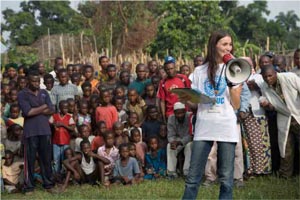|
|
|
Bringing life to peace agreements, documents that are often technical and legal in nature, is a constant challenge for peacekeeping personnel in the field. Building public understanding and support on the ground for peace agreements and the processes that follow - such as elections and disarmament is crucial if the peacekeepers are to have a chance to succeed.
Effectively informing populations of what the peace process entails, and what is required of them has forced peacekeeping missions to be creative in places with serious logistical challenges, high levels of illiteracy, multiple languages, and a lack of access to newspapers, radio and television stations.
In recent decades, many peacekeeping missions have established their own radio and television capabilities to help fill the information gap. But low-tech, traditional methods of outreach have proved indispensable as well. Reaching the public through theatre, music, dance and even comedy has been used to great effect.

|

|
|
Addressing an audience of potential voters, UN civilian staff explain the upcoming elections, using an educational video.
|
A MONUC public information officer addresses the community of Mobeka, Democratic Republic of the Congo.
|